- Home
- Anna Schmidt
Christmas Under Western Skies Page 3
Christmas Under Western Skies Read online
Page 3
Julianne could not help but notice that Nathan was an impressive figure of a man. He was taller than most of the men in the room, and yet his size was not at all intimidating. In fact, he seemed to exude a kind of confidence and leadership that would naturally draw people to him.
He read a passage from the small Bible that Julianne recognized as the one she’d carefully dried along with his other papers—and his journal. She wished now that she had taken Glory’s advice and read more of the journal, and couldn’t help wondering what entry he’d made in his journal since leaving her cabin. It shocked her to realize that what she was really wondering was whether or not he might have mentioned her.
After a hymn, Nathan cleared his throat and looked out over the gathering. It was as if everyone had stopped breathing as they waited for the message this Southerner would bring them.
“I had the privilege of meeting young Master Luke Cooper a few weeks ago,” he began, and all eyes shifted to where Julianne sat between her two children.
“The boy asked me if I’d been on the winning side of the war. Now, all of you good people know the outcome of that conflict by now, but I would say to you the same thing I told Master Cooper. There are no victories in war—only losses. The loss of sons and husbands and brothers and fathers—on both sides. The loss of family ties, as one member chooses one side and another chooses the other. The loss of homes and farms and businesses. The loss of unity among states in a nation founded on unity of purpose. The loss of community. And far above everything, often there has been the loss of faith.”
Julianne’s head shot up. Was it possible that, in their brief conversation, this man had realized that she had lost her faith when Luke died? That in standing by helplessly as the man who had been her strength and protector faded away day by day, in pain and suffering, with his children watching, Julianne had questioned a god who could allow such a thing. And when Luke finally died, she had not prayed with the others, for she had spent all of her prayers and all of her tears, and it had come to nothing. God had not heard her cries for help.
But Nathan was not looking at her as she had expected. He was looking over the crowded room, his eyes skittering from one upturned face to another. “I am here to testify that faith can survive even the most horrific atrocities that man may inflict upon his fellow man. I am here to say that such faith can not only survive, it can sustain. Indeed, faith in God is man’s only weapon against despair.”
Across the aisle from Julianne, Glory Foster’s eyes brimmed with tears, but she was smiling and nodding and murmuring, “Amen,” to each pronouncement out of Nathan’s mouth as she clutched Sam’s gnarled hand.
“A family is a precious thing,” he said, his voice softening. “Every man I ministered to on the battlefield thought first and last of family.”
Unconsciously, Julianne placed one hand on Luke’s knee and the other on Laura’s forearm. Family. Her family. All she had, now that Luke was gone and her relatives back east had abandoned her because she had defied them to love a Yankee. She felt her throat close as she thought about the promise she’d made to herself the night that Luke died. His dream—his life—would not have been in vain. She would work the land, maintain the homestead, and protect the legacy that he had wanted for her and their children.
“A community is like family. And although I have only been here a short time, from what I have seen,” Nathan continued, “this is a community that has come together to sink its roots deep into the tangled soil of the tall grasses. And now, as you enter this season of harvest and holy days, you have opened your homes and hearts to me—a stranger in your midst and I thank God and each of you for that blessing. Let us pray.”
In unison, every head bowed—even Julianne’s.
After services, the schoolyard came alive with chatter, as everyone angled for a position to have a word with Nathan. Julianne watched from a distance, waiting for Glory and Sam to have their turn, before she and the children drove to the Foster farm for the noon meal, as they had every Sunday since Luke’s death.
She heard Jacob Putnam ask Nathan if he might consider a permanent position as minister of the church the community planned to build in the spring. She moved closer, unsure why his answer seemed so important.
“That’s very flattering, sir,” Nathan replied. “But California is my destination. My brother is there and he’s alone. Like I said before—a man needs to know he has family.”
“Contact your brother. Perhaps he might consider—”
“I don’t know where he is, sir,” Julianne heard Nathan admit then he smiled down at the older man. “But I’d be more than pleased to offer services while I’m here, if that helps.”
“It does,” Jacob agreed. “And don’t think you’ve heard the last of this. For some in this town, gathering for worship is about as close to family as they’re likely to get.”
Julianne was sorting through the confusion of her feelings. Shouldn’t she feel relief that he planned to move on come spring? Instead, her relief seemed to grow from the news that he would stay for the winter. Why should anything Nathan Cook did concern her in the least?
“Is the captain coming for Sunday dinner?” She heard Luke, Jr. ask as Sam led Glory across the snowpatched schoolyard to their wagon.
“Not today,” Glory replied. “Seems Emma Putnam has invited the church elders and the captain to her house.”
Julianne had little doubt that her friend was more than a little put out with this affront. “Maybe that’s a good thing,” she suggested. “It certainly seems as if Emma has had a change of heart when it comes to Nathan— Captain Cook.”
Glory glanced over to where Emma was talking excitedly—and loudly—to Nathan, and frowned. “Will you listen to that? All of a sudden she’s acting like she wanted to ask him to take the pulpit today all along—like it was her idea, not my Sam’s.”
“Now Glory,” Sam placated.
“She’s got her eye on him for other reasons, too. You mark my words, she’ll have that scrawny daughter of hers sitting right beside him at the dinner table, but that simpering schoolmarm is no match for that young man. No, sir. He needs a woman who’ll stand up to him, walk alongside him—not behind.”
Julianne could not help but notice that Glory was looking straight at her as she made these pronouncements.
Throughout the noon meal, all conversation continued to focus on Nathan. Julianne was never so glad to be on her way home. But even, there Nathan Cook’s presence filled the tiny cabin.
“Mama?”
Julianne looked up from her needlework to see Laura holding the familiar journal.
“I think this belongs to the captain,” Laura said.
“Yes, you’re right. It must have slipped out of his saddlebag when he left us. I’ll see that he gets it,” Julianne promised, taking the book from her daughter.
So there was the answer to her silly, girlish ruminations about whether or not he might have made mention of her in his writings. How could he, when the journal had been here the entire time?
She fanned the pages with her thumb, catching a word here and there. “Jake” was a word she saw more than once as were the words “faith” and “blessed”.
The jingle of a harness outside the cabin door made Julianne lay the journal aside as the twins abandoned their game of tiddledywinks and rushed to see who might have come to call. For weeks after Luke died, neighbors had dropped by unannounced several times a day. In some cases, they had been simply curious, clearly half-expecting to find Julianne in the process of packing up for the trip back east. Others had been more direct in their purpose. Emma Putnam came with advice—in her view, Julianne was simply being stubborn and doing her “precious little ones” no favor by refusing to leave.
“It’s the captain,” Luke, Jr., announced, then threw open the door, bringing in a rush of cold air and a dusting of snow. Nathan ducked to clear the low doorway, removing his hat as he did so. He ruffled Luke’s hair and smiled at Laura before tur
ning his attention to Julianne.
“Hello,” he said softly, his eyes meeting hers with so steady a gaze that she looked away.
“Well, this is a pleasant surprise,” she said, sounding more like Emma Putnam than herself. She picked up the journal. “I expect you’ve come for this,” she continued in a more normal tone. “Laura found it under the bed. It must have fallen out of your saddlebag.”
Nathan took it from her and chuckled. “Just goes to show how busy I’ve been. I didn’t even miss it. Writing in it was just a way I used to keep myself company on the trail. But since I moved in with the Fosters, and—what did you think of the service this morning?”
Julianne was taken aback at the sudden change of subject, but Luke rushed in to fill the void. “I was kind of hoping for more stories about the fighting,” he said.
“Luke, I believe that you and your sister have chores to attend?”
“Yes, ma’am,” the twins replied in unison, as they collected their outer garments and headed for the door.
“Want me to stable your horse?” Luke asked.
“He’ll be fine, but thank you anyway.”
Luke looked disappointed.
“Come to think of it,” Nathan called after him, “Ol’ Salt would probably appreciate some water if you could crack the ice on that bucket I saw out there.”
“Yes, sir,” Luke replied, and ran from the house leaving his sister to make sure the door was closed.
“I apologize,” Julianne said when they were gone. “Luke gets his directness from his father.”
“And Laura her Southern reticence to pry from you?” Nathan guessed this aloud, as he shifted from one foot to the other. Julianne realized he was still standing just inside the door, still wearing his coat, still holding his hat.
She leapt to her feet and held out her hand for his hat and outer coat. “Well, clearly neither child is learning manners from me today. I’m sorry, Captain, please come and warm yourself by the fire. Even after over three years out here, it’s hard to adjust to such bitter cold.”
“I was thinking on the way over here how, when I was a kid back in Virginia, at this time of year we were still able to be out in our shirtsleeves.” Nathan folded his tall frame onto one of the wooden stools that Luke had fashioned for the table. Luke had been a much smaller man—shorter by a good six inches, and stockier. It was unsettling, seeing Nathan sitting where her husband had once sat.
“Would you like some tea?”
“That would be fine. I’d also really like to know what you thought about today’s service.”
“Why?”
Nathan smiled. “I thought you said your late husband was the direct one.”
“Sorry, but I simply don’t know why my opinion should matter one way or another.”
“The Fosters have a great respect for you, and that tells me that your opinion has meaning.”
Julianne felt the heat rise to her cheeks. “Glory and Sam have been like family to me. I’m afraid they may be prejudiced.” She set a mug of tea and a spoon in front of him, and another at her place, then slid the sugar bowl across the table. “Do you take milk?”
“No, thank you.” He took a long swallow of the hot liquid, then set the mug down and looked at her. “So?”
“I thought it was fine,” she replied.
“Not too much? All that business about us all being pioneers and such?”
“Are you fishing for compliments, Captain Cook?” Julianne laughed, and the sound of it was foreign to her. How long since she had sat at this table and laughed?
Nathan grinned. “Guess I am.”
They each drank their tea and Julianne set down her mug and picked up her needlework.
“I’m real sorry for the loss of your husband,” Nathan said after a moment. “It must be especially hard this time of year, with Christmas coming and all.”
Julianne was so startled that she jabbed herself with the needle and cried out. Nathan reached across the narrow table and examined her finger. “Are you hurt?” He brushed away the single drop of blood with his thumb.
It was the second time the man had taken her hand—the second time she’d been unnerved by the action; and yet, in both cases his attention had been completely innocent and appropriate.
“I’m fine,” she assured him. “I often forget to put on my thimble, and I pay the price. Glory says it’s because my mind is always on things other than my handiwork,” she explained, words coming in a rush, like a creek thawing in spring. “And she may have a point. Certainly, if you look at my work next to Glory’s, you’d know at once who paid the attention necessary to get the stitching perfect.”
“What other things?”
“What?”
“What are you thinking about when you’re stitching?”
The farm. The crops that might never get planted or worse, get washed out if we have a wet spring. The prairie fires that could take everything if we have a dry summer. Having what I need to feed and clothe my children. Making sure that we don’t lose this place after all the work that Luke put into it….
Nathan leaned closer and Julianne realized that she had failed to respond to his question. She forced a smile and got up to refill his mug. “Silliness,” she said.
“Somehow I doubt that.”
“You hardly know me.”
“What I know is that it takes a woman of substance to maintain a spread like this, hang onto the only real home her children have ever known. That, and still have the strength to play the Good Samaritan to a stranger stupid enough to try and find his way across the plains with winter coming on.”
“How are you feeling?” she asked, relieved at the opening to change the subject.
“Better each day. It’s self-defense.”
“I don’t get your meaning.”
Nathan laughed. “Mrs. Foster seems determined to ‘fatten me up’, as she puts it. She claims I’m skinnier than President Lincoln was, and has this notion that putting food in front of me every couple of hours is the only medicine that can possibly build my strength.”
Julianne could not help smiling. “She did the same thing with me after—” She stopped and covered her mouth with her hand. “Would you like more tea?”
“After your husband died?” Nathan guessed.
Julianne nodded and refilled his cup.
“It will ease—the grief and pain,” he assured her.
“I’m sure that on the battlefield you experienced death many times over, Captain. Some of those men were probably friends of yours. And yet—”
“It’s not the same,” he said, and ran his forefinger around the rim of his cup. “You’re right, of course. Still, there are all sorts of losses we must endure over the course of a lifetime. I choose to have faith that each has some purpose.”
Her eyes flared with anger. “I fail to see the purpose in leaving those two children fatherless and—”
“I understand how you might feel that way,” he said.
She wanted to tell him that he couldn’t possibly understand unless he had children who depended on him. But she decided to let the matter drop. After all, he was a guest. “I overheard Jacob Putnam ask you to stay on and consider taking the pulpit permanently.”
“Thinking back on it, I suspect it was a compliment, nothing more. I mean, who would hire someone to minister after just one sermon?”
“Jacob takes his role as mayor quite seriously. He’s determined to establish Homestead as a viable community as quickly as possible. There’s a rumor that the railroad company is looking at a route that could come very close to Homestead.”
“Well, I wish him well, and I’m happy to fill in for as long as I’m here, but I have to get to California.”
“Your brother?”
Nathan nodded and set his cup on its saucer. “Jake was only sixteen when the war started, but my father thought he was old enough to serve. He couldn’t understand why Jake wasn’t as eager to volunteer as every other youth in our area.”
“But surely your mother—”
“She sides with my father no matter the topic. I was already gone, but apparently the argument escalated to the point where one night Jake just took off. He left a note saying he was headed to California because it was as far away from the war as he could get.”
“And you didn’t know?”
“I found out when I went home last spring after General Lee surrendered. Mother said they didn’t want to tell me, for fear it would upset me and I might get careless. They had lost one son, and they couldn’t face losing me as well.”
“But Jake wasn’t lost.”
“He was to them. He had dishonored the family, the South. My father never forgave him—not even on his deathbed. He refused to allow Jake’s name to be spoken in that house after the day he left.”
“And no one has heard from him?”
“No. As I’ve traveled west I’ve placed ads in the California papers, always leaving a general address for a reply, if anyone has seen or heard of him—or if Jake—”
“You don’t even know if he’s alive?”
Nathan shook his head. “Not for sure. But I have faith that God would not send me off on some wild-goose chase. I believe this is the journey I am meant to be on.” He looked up and smiled. “Enough of my misery. What about your family? And your late husband’s? Are the twins’ grandparents in this area as well?”
“No, my parents are still in Virginia, and Luke’s are in Boston.” She got up and wrapped her apron around the handle of the kettle. “More?”
The door slammed open and Luke, Jr., burst inside, breathless with the cold and excitement. “The land agent’s coming,” he announced as Laura crowded in the doorway next to him.
Julianne’s hand went to her throat and her eyes widened with alarm as she glanced quickly around the cabin. as if checking to be sure it could stand inspection.

 Renegade
Renegade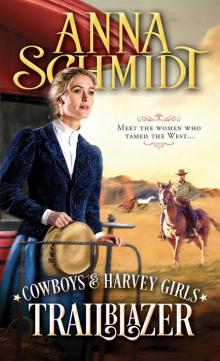 Trailblazer
Trailblazer A Stranger's Gift (Women of Pinecraft)
A Stranger's Gift (Women of Pinecraft)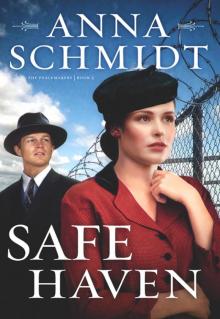 Safe Haven
Safe Haven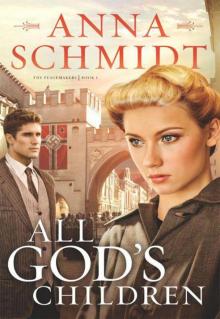 All God's Children
All God's Children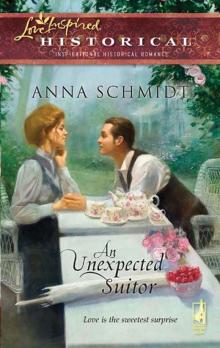 An Unexpected Suitor
An Unexpected Suitor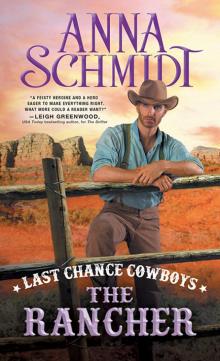 Last Chance Cowboys
Last Chance Cowboys Christmas Under Western Skies
Christmas Under Western Skies Love Finds You in the City at Christmas
Love Finds You in the City at Christmas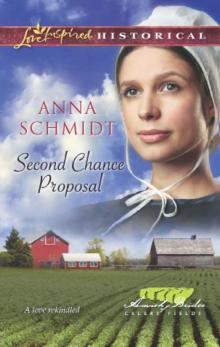 Second Chance Proposal
Second Chance Proposal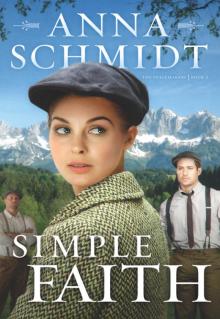 Simple Faith
Simple Faith Mother's Promise
Mother's Promise A Groom for Greta (Amish Brides of Celery Fields)
A Groom for Greta (Amish Brides of Celery Fields)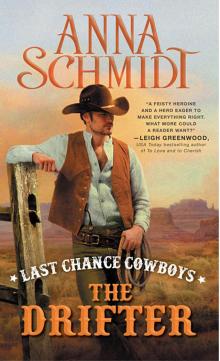 Last Chance Cowboys: The Drifter
Last Chance Cowboys: The Drifter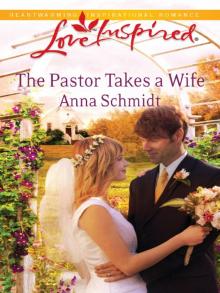 The Pastor Takes a Wife
The Pastor Takes a Wife Hannah's Journey
Hannah's Journey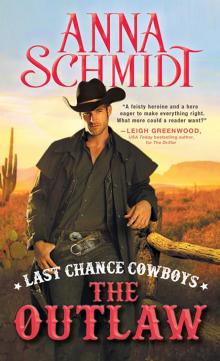 Last Chance Cowboys: The Outlaw
Last Chance Cowboys: The Outlaw Sister's Forgiveness
Sister's Forgiveness